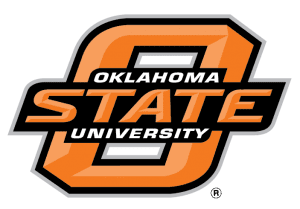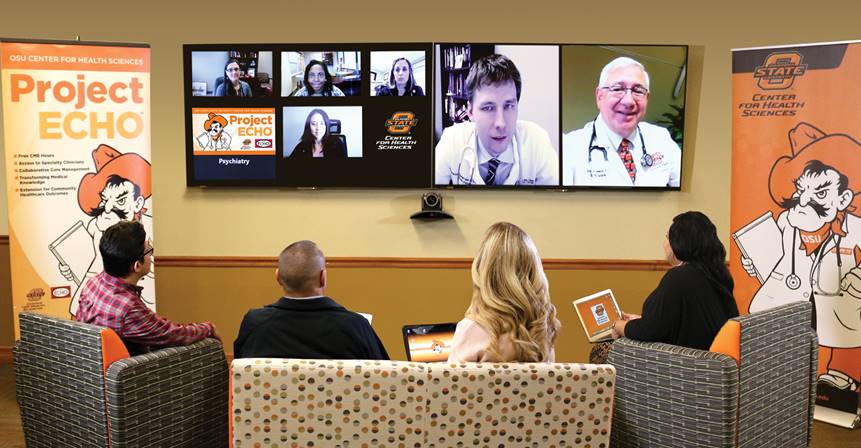Project ECHO Connects Rural Physicians Through OneNet
 A strong support community is essential to success in any profession. This is particularly true for physicians in Oklahoma who are meeting the health care needs of rural patients. Rural physicians are often the only health care worker for an entire city or region, which makes their job critical. It also means they encounter a wide array of medical situations.
A strong support community is essential to success in any profession. This is particularly true for physicians in Oklahoma who are meeting the health care needs of rural patients. Rural physicians are often the only health care worker for an entire city or region, which makes their job critical. It also means they encounter a wide array of medical situations.
When a primary care physician encounters a unique situation, he or she will often recommend that patient visit a specialist. However, rural patients often lack the resources to meet with a specialist quickly, or a specialist might have a long waiting list. The longer an Oklahoman waits to see the specialist, the longer their health needs go unmet.
As Oklahoma State University Center for Health Sciences (OSU-CHS) president and dean of the College of Osteopathic Medicine, Dr. Kayse Shrum continually seeks innovative ways to meet the health care needs of rural Oklahomans and to improve Oklahoma’s health status.
“Our mission at OSU-CHS is to train healthcare professionals for rural and underserved Oklahoma,” said Dr. Joseph Johnson, OSU-CHS assistant dean for clinical education and simulation medicine and chief medical officer of OSU-CHS Project ECHO. “Dr. Shrum has been an unapologetic champion of rural health.”
OSU-CHS advances this mission by recruiting medical students from rural Oklahoma and training them in rural settings, so they will be prepared to meet the demands of these communities and will return to the under served communities that need primary care most. In a digital age, equipping these doctors often involves utilizing technology. Click here to see how OneNet’s technology supports under served communities.
To best help rural doctors, leaders at OSU-CHS adopted the project “Extension for Community Health care Outcomes.” Known as Project ECHO, these sessions utilize video teleconferencing to connect rural health care workers with a multidisciplinary specialist panel at OSU-CHS.
A Project ECHO session is held during a two-hour lunch. A team of doctors, pharmacists, nurses and social service experts at OSU-CHS initiate a video teleconference session with health care workers across the state, creating a knowledge sharing community. The OSU-CHS specialist team conducts a short educational lecture. Afterwards, the participants in the session present specific patient cases to the knowledge sharing community and gain assistance and recommendations on ways to treat a particular condition or a method to identify a medical problem, all without leaving their office or home. This video teleconference session is especially effective because it involves little time and travel costs for the participants but still allows rural health care workers across the state to gain specialty knowledge needed to treat complex medical conditions.

As Oklahoma’s only statewide educational internet network, OneNet is uniquely positioned to support the Project ECHO sessions. OneNet provides OSU-CHS, as well as many health care facilities across the state, with reliable, secure connections that allow these professionals to change the face of modern care.
“Project ECHO is a prime example of how Oklahomans are leveraging technology to stay ahead of the curve,” said OneNet executive director, Vonley Royal. “An extension of OneNet’s mission is to facilitate cutting-edge programs like this through consistent and strong connectivity.”
Project ECHO sessions have proven effective in developing a health care community for rural doctors and health care workers, which improves the livelihood of Oklahomans.
“There are so many health care areas where we can save dollars and lives using this model,” Dr. Johnson said. “We are starting with mental health disorders, which will increase access to care and decrease the burden of the disease process, suicide rates and hospitalizations.”
Dr. Johnson cited an example of a female patient who exhibited mental health issues and was also pregnant. An ECHO session enabled the rural primary care physician to navigate the unique situation through the input of his peers so the mother was treated effectively and the child was born healthy. Rare cases like this can be addressed quickly in the rural physician’s office while the patient is waiting to meet with a specialist. This saves valuable time and improves patient outcomes.
“Dr Shrum had the foresight to put OSU-CHS on the cutting edge of technology and innovation by having our academic health center become the leader in the Project ECHO movement,” said Dr. Johnson.
As Project ECHO sessions become integrated into the rural health care system, Dr. Shrum, Dr. Johnson and other leaders at OSU-CHS are continuing to identify new ways to best serve our state through technology. This stems from OneNet and OSU-CHS’s shared belief that technology is a powerful tool for empowering and serving Oklahomans.
Story by Alexandra Franklin
